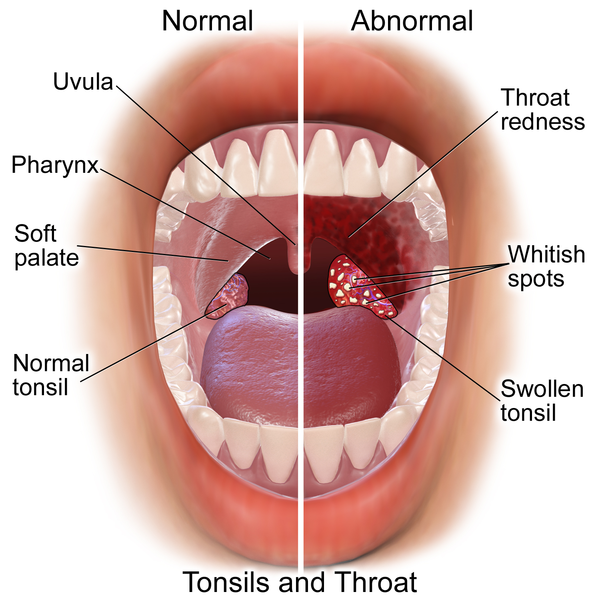Strep Throat Self Care – When you’re suffering from a sore throat, one of the common culprits is strep throat. Strep throat is a bacterial infection that affects the throat and tonsils. It is highly contagious and can cause discomfort and pain, making it difficult to carry out daily activities. While medical treatment is often necessary, there are several self-care measures you can take to alleviate symptoms and speed up your recovery. In this article, we will explore effective self-care tips for managing strep throat.
What is Strep Throat
Strep throat is caused by the Streptococcus pyogenes bacteria and is typically contracted through respiratory droplets from an infected person. It commonly affects children and teenagers but can also occur in adults. Strep throat is characterized by a severe sore throat, difficulty swallowing, red and swollen tonsils, fever, headache, and fatigue.
Recognizing the Symptoms
The symptoms of strep throat can vary from person to person, but some common indicators include:
- Severe sore throat
- Painful swallowing
- Red and swollen tonsils
- White patches or pus on the tonsils
- Fever
- Headache
- Fatigue
- Swollen lymph nodes in the neck
If you experience these symptoms, it is important to get a proper diagnosis from a healthcare professional. They will conduct a physical examination and may perform a rapid strep test or a throat culture to confirm the presence of strep throat.
Hydration is Key
One of the most crucial aspects of strep throat self-care is staying hydrated. Drinking plenty of fluids helps soothe the throat and prevents dehydration. Opt for warm liquids such as herbal teas, warm water with honey, or warm broth. Avoid caffeinated and acidic beverages as they can further irritate the throat.
Gargling with Saltwater
Gargling with warm saltwater can provide temporary relief for a sore throat. Dissolve half a teaspoon of salt in a glass of warm water and gargle for 30 seconds before spitting it out. This helps reduce swelling and discomfort in the throat.
Soothing Your Throat with Warm Liquids
In addition to staying hydrated, consuming warm liquids can help soothe your throat. Sip on warm herbal teas, clear broths, or warm water with lemon and honey. These liquids provide temporary relief and can also help reduce inflammation.
Rest and Adequate Sleep
Resting your body is essential for a speedy recovery. Make sure to get plenty of sleep and avoid strenuous activities that may strain your throat. Adequate rest allows your immune system to fight off the infection effectively.
Over-the-Counter Pain Relief
Over-the-counter pain relievers like acetaminophen or ibuprofen can help reduce pain and fever associated with strep throat. Follow the recommendeddosage instructions and consult with a healthcare professional if you have any underlying health conditions or are taking other medications.
Avoiding Irritants
During your recovery from strep throat, it’s important to avoid irritants that can further aggravate your throat. Stay away from smoking, secondhand smoke, and other pollutants that can irritate the respiratory system. Additionally, try to minimize exposure to dry air, as it can cause throat dryness and discomfort.
Practicing Good Hygiene
Strep throat is highly contagious, so practicing good hygiene can help prevent the spread of the infection. Remember to:
- Wash your hands frequently with soap and water for at least 20 seconds.
- Use hand sanitizer if soap and water are not available.
- Avoid sharing utensils, cups, or towels with others.
- Cover your mouth and nose with a tissue or your elbow when coughing or sneezing.
Using a Humidifier
Using a humidifier in your room can help add moisture to the air, relieving dryness and reducing throat irritation. Opt for a cool-mist humidifier and ensure it is properly cleaned and maintained to prevent the growth of bacteria.
Nutritious Foods for Strengthening Immunity
Maintaining a healthy and balanced diet is crucial for supporting your immune system’s ability to fight off the infection. Include nutrient-rich foods like fruits, vegetables, lean proteins, and whole grains in your meals. Foods rich in vitamin C, such as citrus fruits, strawberries, and bell peppers, can be particularly beneficial for boosting immunity.
Herbal Remedies
Certain herbal remedies can provide relief and support your recovery from strep throat. Slippery elm, licorice root, and marshmallow root are known for their soothing properties and can help alleviate throat pain. However, it’s important to consult with a healthcare professional before using any herbal remedies, especially if you have underlying medical conditions or are taking other medications.
When to Seek Medical Attention
While self-care measures can help manage strep throat, it is crucial to seek medical attention if:
- Your symptoms worsen or do not improve within 48 hours.
- You experience difficulty breathing or swallowing.
- You develop a high fever.
- You notice a rash or skin discoloration.
Preventing the Spread of Strep Throat
To prevent the spread of strep throat to others, take the following precautions:
- Cover your mouth and nose when coughing or sneezing.
- Dispose of tissues properly after use.
- Wash your hands frequently and encourage others to do the same.
- Avoid close contact with others until you have completed a full course of antibiotics.
Conclusion
Strep throat can be a painful and uncomfortable condition, but with proper self-care, you can alleviate symptoms and promote a speedy recovery. Remember to stay hydrated, rest, and take over-the-counter pain relievers as needed. Avoid irritants, practice good hygiene, and consider using a humidifier. Incorporate nutritious foods and, if suitable for you, explore herbal remedies to soothe your throat. If symptoms persist or worsen, seek medical attention promptly.
FAQs
- Can strep throat go away without antibiotics?
- Strep throat is usually treated with antibiotics to prevent complications and reduce the duration of symptoms. It is important to consult with a healthcare professional for an accurate diagnosis and appropriate treatment.
- How long does it take to recover from strep throat?
- With proper treatment and self-care, most people recover from strep throat within a week. However, individual recovery times may vary.
- Can strep throat be prevented?
- Practicing good hygiene, such as washing hands frequently and avoiding close contact with infected individuals, can help reduce the risk of contracting strep throat. However, it maynot always be possible to prevent its occurrence entirely.
- Are there any long-term complications associated with strep throat?
- If left untreated, strep throat can lead to complications such as tonsillitis, sinus infections, ear infections, and rheumatic fever. Prompt medical treatment can help prevent these complications.
- Can I return to work or school with strep throat?




